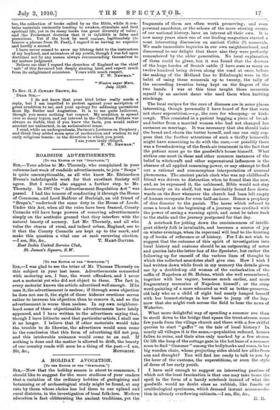A HOLIDAY AVOCATION.
[TO THE EDITOR OP THE " SPIECTATOT41
SIE,—Now that the holiday season is about to commence, I should like to suggest for the more studious of your readers that a variation of the ordinary hobbies of geologising and botanising or of archaeological study might be found, at any rate by those whose choice has led them to our upland and rural districts, in the investigation of local folk-lore. Modern education is fast obliterating the ancient traditions, yet the fragments of them are often worth preserving ; and _even personal anecdotes, or the echoes of the more stirring events of our national history. have an interest all their own. It is_ now many years since one of our leading magazines started a most interesting discussion on ancient Celtic (?) numerals. We made immediate inquiries in our own neighbourhood, and discovered to our delight that there also they were perfectly remembered by the older generation. No local explanation • of them could- be given, but it was found that the drovers of the huge hordes of Scotch cattle (I have seen as many as twelve hundred being driven along- the road at once, before the making of the Midland line to Edinburgh) were in the habit of using these numerals up to twenty, the tally of the succeeding twenties being kept on the fingers of the two hands. I was at this time taught these numerals myself by an ancient dame who used them when knitting stockings.
The local recipes for the cure of diseases are in some places interesting, though personally I have heard of few that were not sheer superstition,—e.g., the cure for whooping- or kink- cough. This consisted in a patient begging a piece of bread- and-butter from a married woman who had not changed her surname on marriage. It was necessary that she should bake the bread and churn the butter herself, and one can only sup- pose that the further attentions of such a thrifty housewife might have something to do with the cure,—or possibly there was a foreshadowing of the fresh-air treatment in the fact that the patient must go to the goodwife's house himself. What strikes one most in these and other common instances of the belief in witchcraft and other supernatural influences is the. absence of all applied reasoning-power, or any attempt to find out a rational and commonplace interpretation of unusual phenomena. The ancient parish clerk who was my childhood's friend was driven to distraction when he found that the new, and, as he expressed it, the unblessed, Bible would not stay decorously on its shelf, but was inevitably found face down- wards on the floor whenever the church had been left empty of human occupants for even half-an-hour. Hence a prophecy of dire disaster to the parish. The horse which refused to cross a brook at the beginning of a journey was credited with the power of seeing a warning spirit, and must be taken back to the stable and the journey postponed for that day.
A notebook for jotting down the reminiscences of intelli- gent elderly folk is invaluable, and becomes a source of joy on winter evenings, when its reperusal will lead to the hunting up of books of reference or of history. For I do not wish to suggest that the outcome of this spirit of investigation into local history and customs should be an outpouring of notes and queries into the letter-box of the Spectator, but rather the following up for oneself of the various lines of thought to which the collected anecdotes shall give rise. How I wish I had written down while fresh in my memory the details given me by a doubled-up old woman of the embarkation of the coffin of Napoleon at St. Helena, which she well remembered, together with her vaguer, because much earlier, and more fragmentary memories of Napoleon himself ; or the crisp word-painting of a more educated as well as better-preservet. old lady who as a child of eight had nearly hanged herself with her bonnet-strings in her haste to jump off the hay- mow that she might rush across the field to hear the news of Waterloo.
What more delightful way of spending a summer eve than to stroll down to the bridge that spans the trout-stream some few yards from the village church and there with a few skilful queries to start " gaffer" on the tale of local history P In nearly all villages it is the same,—population reduced, houses fallen to ruins; and their sites only marked by a few stones. Or lift the hasp of the cottage gate in the hot haze of a sumuter noon to find "Gammer " among the hollyhocks and roses, in her big wooden chair, whose projecting sides shield her alike from sun and draught? You will find her ready to talk to you by the hour of the customs, the superstitions, or even the style
of dress of her early youth. .
I have said enough to suggest an interesting pastime of which not the least fascination is that one may take home the spoil in the form, of a handy notebook instead of what the goodwife would no doubt class as rubbish, like fossils or ornithological specimens, which demand instant accommoda- thin in aheady overflowing cabinets,—I am, Sir, &o
R.


















































 Previous page
Previous page